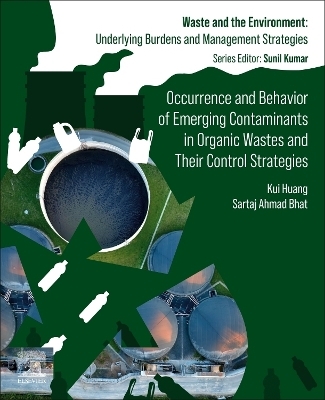
Occurrence and Behavior of Emerging Contaminants in Organic Wastes and Their Control Strategies
Elsevier - Health Sciences Division (Verlag)
978-0-443-13585-9 (ISBN)
Kui Huang is a professor and department chairman of specializing in the subject of environmental ecological engineering at the School of Environmental and Municipal Engineering, Lanzhou Jiaotong University, China. He received his PhD in Civil and Environmental Engineering from Gifu University, Japan in 2014. He served as a researcher for the River Basin Research Center at Gifu University for two years before joining Lanzhou Jiaotong University in 2015. His teaches courses including water engineering construction and environmental ecological engineering. His research interest involves fundamental and applied aspects of biological contaminant reduction, aerobic biodegradation process, water quality safety in river basin, and organic solids recycling, with a focus on biological and sustainable treated system of wastes by earthworms. Dr. Sartaj Ahmad Bhat is working as a JSPS Postdoctoral Researcher at the River Basin Research Center, Gifu University, Japan. He received his Ph.D. in Environmental Sciences from Guru Nanak Dev University, India, in 2017. His primary research focuses on the development and evaluation of treatment technologies for organic waste and wastewater from domestic and industrial outlets as well as organic waste recycling, with a focus on the biological and sustainable treatment by earthworms. He has published over 60 papers in peer-reviewed journals and co-edited 13 books. Dr. Bhat serves as an associate/academic editor, editorial board member, or advisory board member on more than 15 journals. He has been awarded several postdoctoral/research fellowships, and has also received the 2020 Outstanding Reviewer Award from the International Journal of Environmental Research and Public Health and Top Peer Reviewer 2019 award for Environment and Ecology (Web of Science).
Part I: Occurrence of Emerging Contaminants in different organic wastes
1. Fate of antibiotic resistance genes in organic wastes from Sewage Treatment Plants in the framework of the Circular Economy
2. Fate and behavior of microplastics in biosolids
3. Occurrence, fate, detection, ecological impact and mitigation of antimicrobial resistance genes derived from animal waste
4. Electrical and electronic waste: an emerging global contaminant
5. Occurrence, detection and classification of microplastics in excess sludge
Part II: Behaviour of Emerging Contaminants in organic wastes
6. Fate of personal care products and pharmaceuticals in sewage sludge
7. Environmental behaviors of exogenous emerging contaminants on the anaerobic digestion of waste activated sludge
Part III: Control strategies of Emerging Contaminants in organic wastes treatment
8. Role of biochar in removal of contaminants from organic wastes: A special insights to eco-restoration and bio-economy
9. Effect of additives on the reduction of antibiotic resistance genes during composting of dewatered sludge
10. Removal of Antibiotic Resistance Genes in Sewage Sludge Vermicomposting: A mini-review
PART IV: Organic Waste
11. Critical influence factors for decreasing the antibiotic resistance genes during anaerobic digestion of organic wastes
12. Occurrence, Behaviour, and Fate of Microplastics in Agricultural and Livestock Wastes and its Impact on Farmer’s Fields
13. Organic Waste Management and Health
| Erscheinungsdatum | 12.03.2024 |
|---|---|
| Reihe/Serie | Waste And The Environment: Underlying Burdens And Management Strategies |
| Verlagsort | Philadelphia |
| Sprache | englisch |
| Maße | 191 x 235 mm |
| Gewicht | 550 g |
| Themenwelt | Naturwissenschaften ► Biologie ► Ökologie / Naturschutz |
| Technik ► Umwelttechnik / Biotechnologie | |
| ISBN-10 | 0-443-13585-1 / 0443135851 |
| ISBN-13 | 978-0-443-13585-9 / 9780443135859 |
| Zustand | Neuware |
| Haben Sie eine Frage zum Produkt? |
aus dem Bereich


